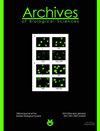Interleukin-1β, interleukin-6 and interleukin-10 polymorphisms in Tnisian patients with colorectal cancer and liver metastasis
IF 0.8
4区 生物学
Q4 BIOLOGY
引用次数: 1
Abstract
The balance between pro- and anti-inflammatory cytokine expression is essential for an efficient immune response and for the regulation of cancer development and progression. This study analyzed the expression and genetic variation in IL-1?, IL-6 and IL-10 genes and the possible associations with colorectal cancer (CRC) and colorectal liver metastases (CRLM).We examined IL-1?, IL-6 and IL-10 mRNA expression and three gene variants: IL-1? (rs1143627), IL-10 (rs1800872) and IL-6 (rs1800795), in 198 CRC, 65 CRLM patients and 230 controls. Carriers of the C/T genotype of IL-1? (rs1143627) have an increased risk of developing CRC and CRLM. T/T genotype carriers have a higher risk of CRLM incidence. For IL-10 (rs1800872), patients harboring the C/A genotype have a lower risk of CRC and CRLM occurrence. For IL-6 (rs1800795), the C/C genotype heightens the risk of CRLM development. Overall survival analysis showed that carriers of the C/T genotype of IL-1? (rs1143627) have a worse overall survival in CRC patients. It can be concluded that interleukin genetic variants can be used as biomarkers to detect and predict clinical outcomes and prognostic factors for CRC and CRLM.白介素-1β、白介素-6和白介素-10在大肠癌及肝转移患者中的多态性
促炎性和抗炎性细胞因子表达之间的平衡对于有效的免疫反应和调节癌症的发生和进展至关重要。本研究分析了IL-1?IL-6和IL-10基因与结直肠癌(CRC)和结直肠癌肝转移(CRLM)的可能关系。我们检查了IL-1?、IL-6和IL-10 mRNA表达和三个基因变异:IL-1?(rs1143627)、IL-10 (rs1800872)和IL-6 (rs1800795)在198例结直肠癌患者、65例CRLM患者和230例对照组中进行检测。C/T基因型IL-1携带者?(rs1143627)发生CRC和CRLM的风险增加。T/T基因型携带者发生CRLM的风险较高。对于IL-10 (rs1800872),携带C/A基因型的患者发生CRC和CRLM的风险较低。对于IL-6 (rs1800795), C/C基因型增加了CRLM发展的风险。总体生存分析显示,C/T基因型IL-1?(rs1143627)在结直肠癌患者中总生存率较差。由此可见,白细胞介素遗传变异可作为检测和预测CRC和CRLM临床结局和预后因素的生物标志物。
本文章由计算机程序翻译,如有差异,请以英文原文为准。
求助全文
约1分钟内获得全文
求助全文
来源期刊
CiteScore
1.40
自引率
0.00%
发文量
25
审稿时长
3-8 weeks
期刊介绍:
The Archives of Biological Sciences is a multidisciplinary journal that covers original research in a wide range of subjects in life science, including biology, ecology, human biology and biomedical research.
The Archives of Biological Sciences features articles in genetics, botany and zoology (including higher and lower terrestrial and aquatic plants and animals, prokaryote biology, algology, mycology, entomology, etc.); biological systematics; evolution; biochemistry, molecular and cell biology, including all aspects of normal cell functioning, from embryonic to differentiated tissues and in different pathological states; physiology, including chronobiology, thermal biology, cryobiology; radiobiology; neurobiology; immunology, including human immunology; human biology, including the biological basis of specific human pathologies and disease management.

 求助内容:
求助内容: 应助结果提醒方式:
应助结果提醒方式:


